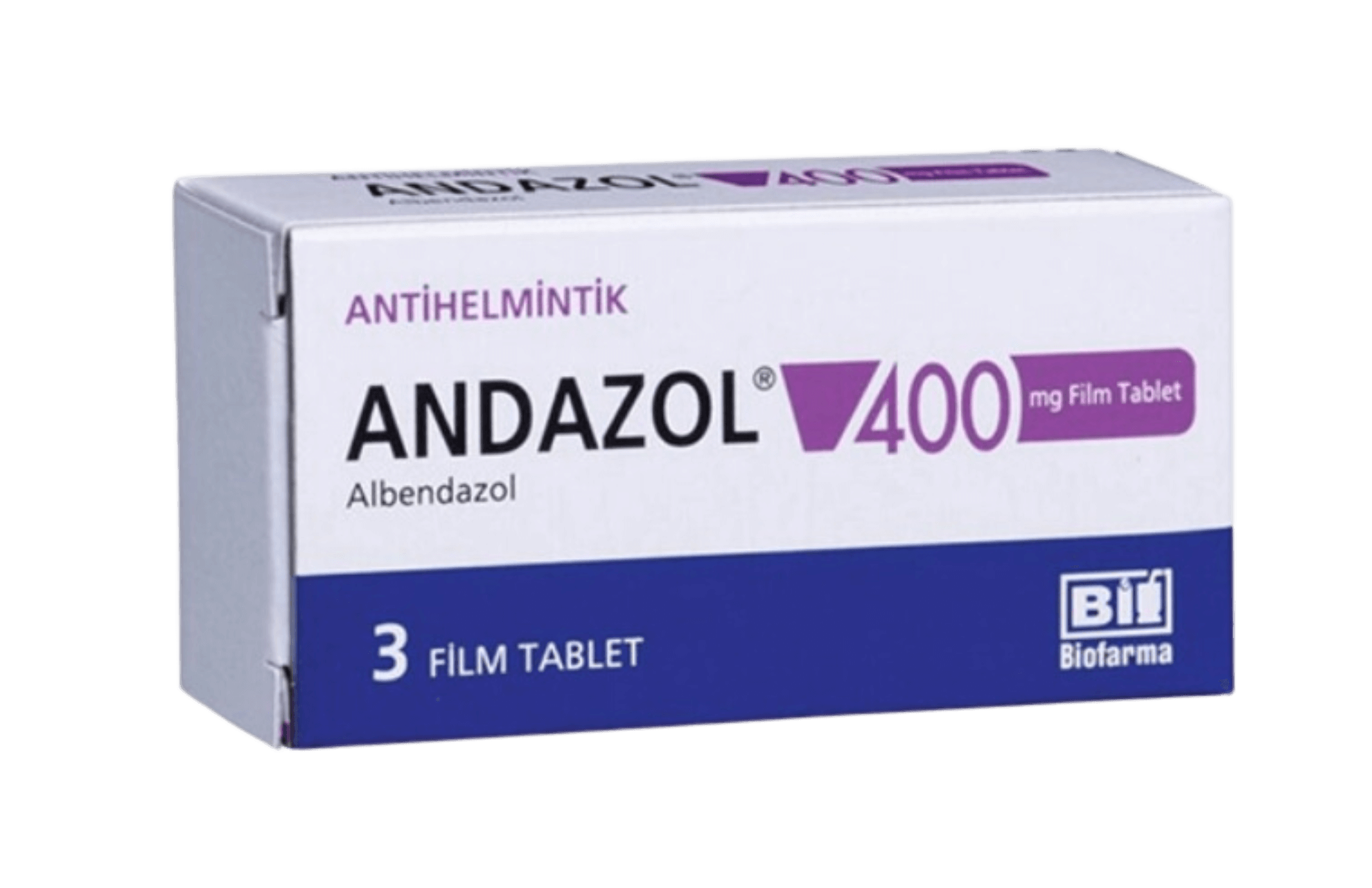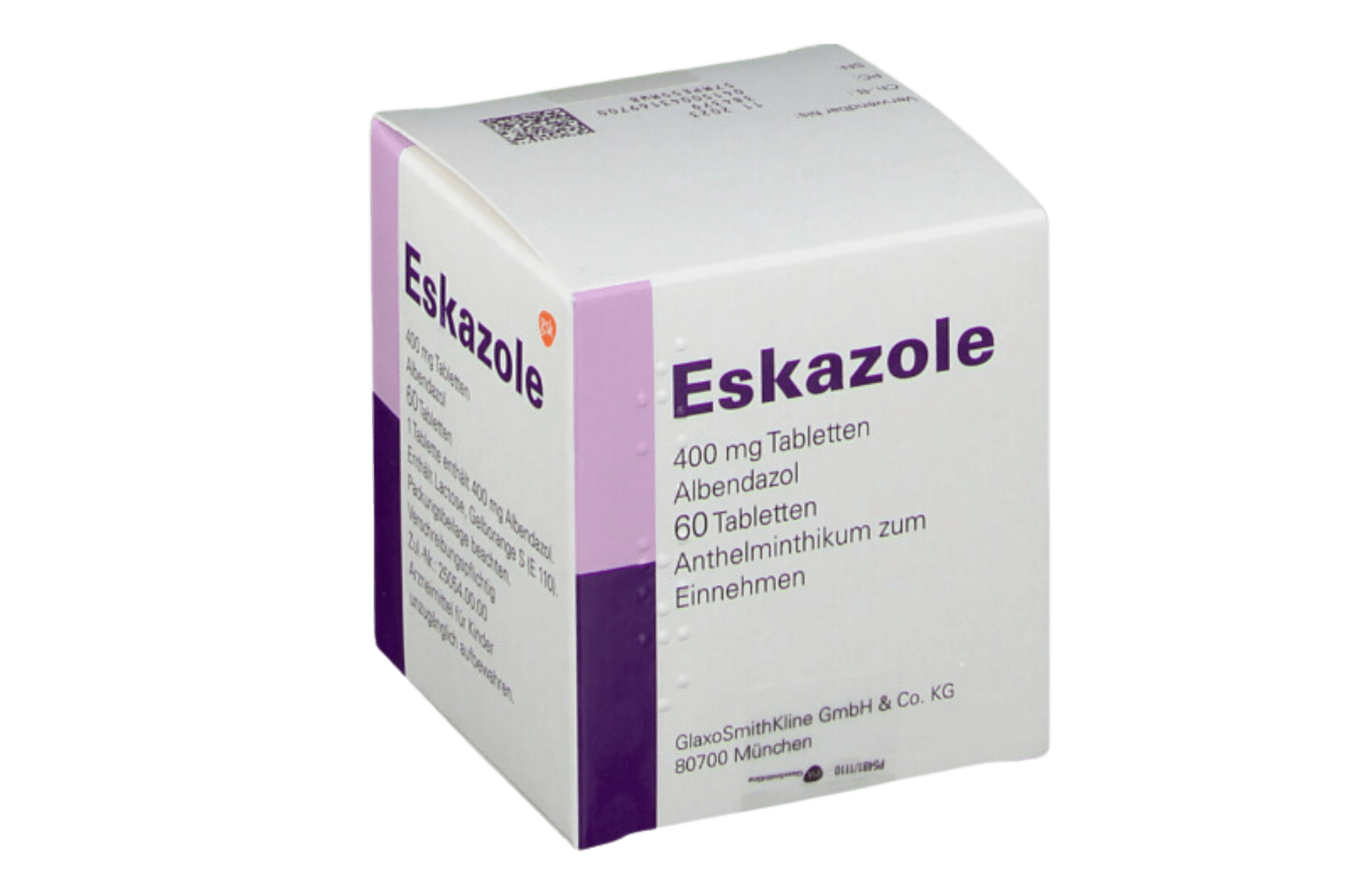Albenza/Eskazole/Andazol (generic name: albendazole) is a
broad-spectrum anthelmintic medication used to treat parasitic worm infections. It is primarily prescribed for
neurocysticercosis, an infection of the nervous system caused by
Taenia solium larvae (pork tapeworm), and
hydatid disease, a serious condition caused by
Echinococcus granulosus (dog tapeworm) larvae.
Albendazole works by
inhibiting tubulin polymerization, which disrupts the parasites’ ability to absorb glucose. This process depletes their energy stores, ultimately leading to their
death and elimination from the body. As a
benzimidazole carbamate, Albenza is effective against a range of
helminthic infections, making it a crucial treatment option for individuals exposed to these parasites.
Caution
Albendazole may cause
birth defects. Women of childbearing age should use
effective contraception during treatment and for at least 1 month after stopping Albenza. Women who are pregnant or are planning to become pregnant, and mothers who are breastfeeding, should only take Albenza with a doctor’s approval. If you become pregnant while on a course of treatment with Albenza, inform the doctor immediately.
People being treated for parasite infections may also have a condition called neurocysticercosis caused by parasites in the brain. Albenza can cause a reaction in the brain when the parasites are killed. If a combination of the following symptoms occurs between a few hours and up to a week after taking the drug, inform a doctor immediately:
- severe headaches
- nausea and vomiting
- fits (seizures)
- problems with your vision.
Dosage
It is essential to follow the prescribing doctor’s instructions.
The dosage of Albenza varies based on the specific infection and the patient’s weight:
- For neurocysticercosis:
- Adults and children weighing more than 60 kg: 400 mg twice daily with meals for 8 to 30 days.
- Patients weighing less than 60 kg: 15 mg/kg/day, divided into two doses, for the same duration.
- For hydatid disease:
- Adults and children weighing more than 60 kg: twice daily for 28 days per cycle. Three cycles are usually required, with a 14-day break between each cycle.
- Patients less than 60 kg: 15 mg/kg/day, divided into two doses (max 800 mg/day).
It is crucial to take Albenza with food to enhance absorption. If a dose is missed, it should be taken as soon as remembered unless it is near the time for the next dose; in such cases, skip the missed dose and resume the regular schedule. Do not double-dose to make up for a missed dose.
Storage
Albenza tablets should be stored at room temperature, between 20-25°C (68-77°F). Keep the medication in its original container, tightly closed, and protect it from moisture. For more information, read our article on drug storage.
Common Questions About Albenza
How long does it take for Albenza to work?
Albenza begins working
immediately upon absorption, but the time required to clear the infection depends on the
type of parasite and the severity of the condition. In cases of
neurocysticercosis, treatment typically lasts
8 to 30 days, and parasite death can occur gradually over this period. For
hydatid disease, multiple treatment cycles are required, spanning several weeks to months. Some patients may require
surgical removal of cysts alongside medication. Clinical improvement, including reduced symptoms and parasite elimination, is usually seen
within weeks of completing treatment.
What is the mechanism of action of albendazole?
Albendazole works by
binding to beta-tubulin, which inhibits
microtubule formation in parasites. This process
prevents glucose uptake, ultimately leading to the parasites’
starvation and death. The drug also affects
cell division, which stops the parasite from reproducing.
What causes neurocysticercosis?
Neurocysticercosis is caused by
accidental ingestion of T solium eggs, which hatch in the intestines and travel to the brain, forming cysts. The primary source of infection is
undercooked pork, contaminated water, or poor hygiene.
Is albendazole safe for children?
Yes, albendazole is
approved for pediatric use, but the dosage is based on
body weight.
This text is for informational purposes only. Please consult a doctor or pharmacist before using any medication.
Read the information leaflet that comes with the medication.
Most people who use Albbenza do not experience any adverse side effects. Doctors prescribe this medication because they assess the benefits of such treatment outweigh any likely unwanted effects.
Some of the side effects that have been reported include:
- Gastrointestinal distress, causing nausea, vomiting, and abdominal pain.
- Headaches and dizziness during treatment.
- Elevated liver enzymes, which can indicate potential liver irritation or damage.
Serious side effects that require immediate medical attention include signs of bone marrow suppression, such as unexplained bruising or bleeding, severe fatigue, or infection, such as fever and sore throat.
Not all side effects are listed here. If these or other unlisted symptoms persist or worsen, consult a healthcare provider or pharmacist.
Albenza is FDA-approved for treating a variety of parasites or worms including threadworm (pinworm), roundworm, whipworm,
tapeworm and hookworm, causing:
-
Neurocysticercosis
Neurocysticercosis is an infection of the brain and central nervous system caused by the larvae of Taenia solium (pork tapeworm). This condition occurs when ingested eggs from contaminated food or water develop into larvae that migrate to the nervous system, forming cysts in the brain.
Symptoms include:
- Seizures
- Headaches
- Nausea and vomiting
- Mental disturbances
- Neurological impairments (e.g., confusion, balance issues)
-
Hydatid Disease
Hydatid disease is a zoonotic infection caused by the larvae of Echinococcus granulosus (dog tapeworm). Humans become infected by consuming contaminated food or water or through direct contact with infected animals. The larvae form cysts in the liver, lungs, and other organs, leading to severe complications.
Symptoms include:
- Abdominal pain or discomfort
- Liver or lung cyst formation
- Chest pain and difficulty breathing
- Nausea and weight loss
Off-label, albendazole is also used to treat other parasitic infections, including ascariasis, trichuriasis, and strongyloidiasis, which all present with symptoms like gastrointestinal discomfort and malnutrition.














